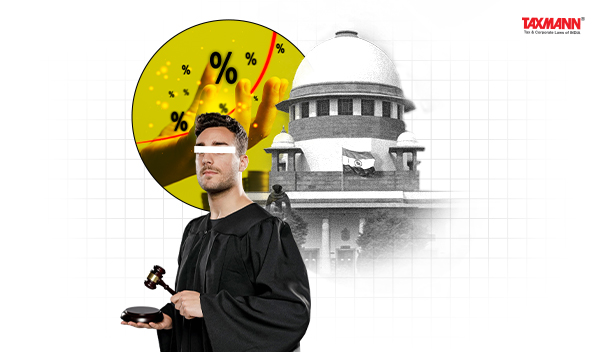Interest u/s 234B Is Payable Only Up to Stage of Sec. 245D(1) | ITSC Rightly Restricted Interest Liability | HC
- Blog|News|Income Tax|
- 3 Min Read
- By Taxmann
- |
- Last Updated on 8 October, 2024

Case Details: Commissioner of Income-tax (Central) vs. Dalip Kumar Banthiya - [2024] 167 taxmann.com 121 (Delhi)[12-09-2024]
Judiciary and Counsel Details
- Yashwant Varma & Ravinder Dudeja, JJ.
-
Anurag Ojha, SSC Ms Hemlata Rawat & V.K. Saksena, Advs. for the Petitioner.
-
Ms Kavita Jha, Sr. Adv. Balwinder Singh Suri & Vaibhav Kulkarni, Advs. for the Respondent.
Facts of the Case
The assessee had filed a settlement application under section 245C(1) before the Income Tax Settlement Commission (ITSC) for waiver of interest under sections 234A, 234B and 234C. The ITSC held that the interest under section 234B on the income as disclosed in the statement of facts would be charged up to the date of admission of the application under section 245D(1). However, the Commissioner of Income Tax contended that the interest should be computed till the order is passed by the ITSC under section 245D(4).
Aggrieved by the order, a writ petition was filed before the Delhi High Court.
High Court Held
The High Court held that section 234B principally governs the issue of liability to pay interest in cases of default in payment of advance tax. The proviso to section 245C(1) states that the applicant is liable to pay tax and interest on the entire amount of total income as disclosed in an application under section 245C(1). Thus, the statute places a positive and unerring obligation upon the applicant to ensure that the entire amount of tax, along with interest in accordance with the disclosures made in the application, had been paid on or before the submission date alone. The said proviso further requires proof of such payment to be attached to the application. The entire amount of tax liability computed upon the total income disclosed in that application was thus liable to be discharged before the application was submitted. This would have entailed not only the computation of tax payable on the total income as disclosed in that application but also the payment of interest that would have otherwise been attracted in terms of section 234A, section 234B and other cognate provisions in the statute.
Once made, the application is liable to be placed before the ITSC, which follows the procedure prescribed in section 245D. As a sine qua non for the consideration of the application, the ITSC must first be satisfied that the applicant has made a full and true disclosure with respect to all details pertaining to income and the amount at which a settlement is prayed to be entered. This becomes apparent from section 245D(1), enabling the ITSC to issue a notice to the applicant to explain why the application should be allowed to proceed. The ITSC is further enabled to call for reports and records from the Principal Commissioner with respect to the disclosures as made in such an application.
It is only after the ITSC is convinced that the applicant has made a full, true and candid disclosure, the application is admitted for further consideration. The amount the applicant may ultimately be called upon to pay could hypothetically be more than that which may be disclosed in the statement of facts. This is by virtue of the exercise and inquiry that the ITSC can undertake in terms of sub-section (3) and (4) thereof. It is only upon the conclusion of that inquiry that the ITSC proceeds to fame a formal order in terms contemplated under sub-section (4)(a) and frame consequential directions in accordance with sub-section (6).
Further, relying upon the distinction as laid down in the Supreme Court Judgement in the case of Brij Lal and Others v. Commissioner of Income Tax [2010] 194 Taxman 566/328 ITR 477 (SC) between the admission of an application under section 245D(1) and the determinative exercise which the ITSC ultimately takes under section 245D(4), it was held that the interest liability flowing from section 234B cannot go or travel beyond the date of admission of the application under section 245D(1).
Disclaimer: The content/information published on the website is only for general information of the user and shall not be construed as legal advice. While the Taxmann has exercised reasonable efforts to ensure the veracity of information/content published, Taxmann shall be under no liability in any manner whatsoever for incorrect information, if any.

Taxmann Publications has a dedicated in-house Research & Editorial Team. This team consists of a team of Chartered Accountants, Company Secretaries, and Lawyers. This team works under the guidance and supervision of editor-in-chief Mr Rakesh Bhargava.
The Research and Editorial Team is responsible for developing reliable and accurate content for the readers. The team follows the six-sigma approach to achieve the benchmark of zero error in its publications and research platforms. The team ensures that the following publication guidelines are thoroughly followed while developing the content:
- The statutory material is obtained only from the authorized and reliable sources
- All the latest developments in the judicial and legislative fields are covered
- Prepare the analytical write-ups on current, controversial, and important issues to help the readers to understand the concept and its implications
- Every content published by Taxmann is complete, accurate and lucid
- All evidence-based statements are supported with proper reference to Section, Circular No., Notification No. or citations
- The golden rules of grammar, style and consistency are thoroughly followed
- Font and size that’s easy to read and remain consistent across all imprint and digital publications are applied



 CA | CS | CMA
CA | CS | CMA
